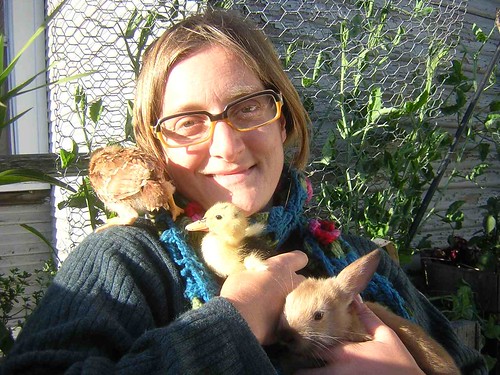Advertisement
Notes From an Urban Farmer

Urban farmer Novella Carpenter’s hens feed on the weeds in the cracks of the sidewalks in Oakland, California. On an abandoned lot on her dead-end street, she’s coaxed all sorts of things to thrive -- carrots and watermelon, pigs, eggs, and bees -- with some seeds, some sun, and many, many truckloads of horse manure. She writes about it in great, glorious detail, in "Farm City: The Education of an Urban Farmer."
She joined us Thursday — along with urban farming visionary Will Allen (Novella calls him a “hero of urban farming”) -- to talk about growing food in the inner city (listen to full hour here). We asked if she'd share some follow-up thoughts -- on hygiene, hydroponics, and growing year-round. She sent us this:
Thank you so much On Point for having me on the radio. It's funny, wherever I go, someone has a story about farming: after the show, the sound engineer (in Berkeley) pulled out his iPhone and showed me photos of his amazing harvest of Gravenstein apples and the resultant apple sauce that he and his wife had canned. People are really starting to connect with their food and are feeling empowered by home food production.
Which brings up some of the issues that callers raised and we didn't have enough time to fully discuss. One of the amazing opportunities I've had as an author touring around the country to promote my book, "Farm City," has been to meet fellow urban farmers. And like Will Allen mentioned, many of them are people of color or working class folks. I had a Latina woman give me a kiss on the cheek at a reading in Los Angeles because she said I was making Latino farm workers proud of their skills, and as a young woman she was learning to embrace that culture of hard work and good food. We've forgotten that farming is an art, science, and craft. Anyone who has a history of doing this work in their family should be proud of that history because food is so elemental, so powerful.
Living in Oakland, I've met quite a few former Black Panthers, and they've reminded me that part of the Black Panthers' programs was to feed their people healthy food, and they even had school garden projects that taught children about good nutrition and organic gardening. This was in the 1970s! It's only recently that inner-city people have been forced to eat cheap, unhealthy fast food because it is all they can afford. When I see people in my neighborhood coming into my garden to eat a tomato or pick some greens for dinner, I feel so happy that I've created that possibility. And it's the least I can do--as a squatter, I want to give something back.
In terms of the caller who was worried about odors and dangers associated with urban livestock, she was right that urban areas in the 1800s had some management issues. Cows were being kept in garages and fed swill from the local distilleries, pigs ran free, eating garbage and terrorizing people. However, our society is very different now, and in cities especially animal welfare is a huge concern. I would argue that cities might make better places for raising livestock because best practices would have to be maintained or the neighbors would complain. Can you imagine living right next to an industrial cattle feedlot? There would be an outcry from the public. Since there are neighbors watching (and smelling), you have to keep things tidy and reasonable (as I discovered while raising my pigs and too many chickens.)
Finally, there was a question about hydroponics and year-round growing. As a Californian, the only hydroponics I'm familiar with are for growing a certain cash crop. I have traveled to Venezuela where they have a big program of organiponicos--basically tables with some soil that are fed nutrients. But again, that's a tropical place. In 19th-century Paris, there was a large farm near the center of town where the crops were grown under cloches and kept warm with the decomposition of horse manure (then the major way to get around). So I advise that person to start researching what people did historically: we're going to have to re-learn things that our ancestors did. Another example is keeping root cellars. You can store apples and carrots in sand, for instance, and they will last a good long time. And I'm totally inspired by Will Allen's innovations and ability to grow so much throughout the year in the cold Midwest.
-- Novella Carpenter
This program aired on July 31, 2009. The audio for this program is not available.